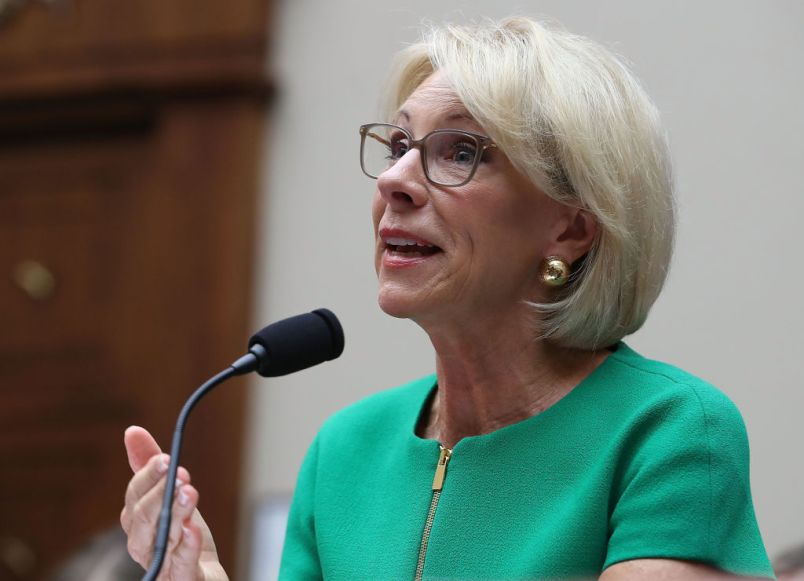WASHINGTON (AP) — Choking back tears, she testified that he sexually assaulted her. Defensive and angry and also choking back tears, he swore that he did not.
The dramatic Senate testimony last week by Christine Blasey Ford and Supreme Court nominee Brett Kavanaugh came as Education Secretary Betsy DeVos considers new guidelines that could drastically change the way allegations of sexual violence are investigated on college campuses.
Brett Sokolow, a lawyer who heads an association of sexual harassment investigators on campuses, said his colleagues closely watched the hearing and may use it for future trainings.
“If this was a student, would I believe them, would I not?” Sokolow said. “Who comes out being credible?”
DeVos has argued that the policy put in place under President Barack Obama is skewed against the accused. She is expected to issue new rules in the near future.
At stake is whether schools should require higher standards of evidence when handling complaints and whether both parties should have access to that evidence. Also under review is the use of mediators and the possibility of the accuser and the accused cross-examining each other.
DeVos’ new guidelines are expected to address whether schools should have to investigate as soon as they are aware of alleged misconduct or only after a student files a formal complaint.
Many victims of sexual violence never take that step. Ford didn’t, and only acted decades later when she learned that Kavanaugh was on a short list for the Supreme Court.
Advocates point to the Larry Nassar sexual assault scandal at Michigan State University and say that victims are shocked and unwilling to relive their traumatic experience. They say it should be the school’s responsibility to investigate.
“It is the debate that we are having about how to handle these allegations on high school and college campuses,” said Mike Petrilli, president of the conservative Thomas B. Fordham Institute.
A Senate vote on Kavanaugh’s nomination was delayed for a week so the FBI could investigate after GOP Sen. Jeff Flake of Arizona, a pivotal vote, called for further investigation. A few hours earlier on Friday, Flake had said he would support Kavanaugh, a federal appeals court judge.
Ford, a California psychology professor, has accused Kavanaugh of pinning her to a bed while he was intoxicated, trying to remove her clothes and placing a hand over her mouth as she tried to yell for help. Ford says the incident took place more than 35 years ago when they both were in high school.
Kavanaugh adamantly denies the accusations and says he has never sexually attacked any one. He accuses Democratic senators of seeking to derail his nomination at all costs.
The Department of Education declined to comment Friday about DeVos’ plans for revising the sexual assault rules. But when issuing temporary guidance last year, DeVos said she was looking for a more balanced approach.
“Every survivor of sexual misconduct must be taken seriously. Every student accused of sexual misconduct must know that guilt is not predetermined,” she said in September 2017. “These are non-negotiable principles.”
Sejal Singh with the advocacy group Know Your IX, which refers to a federal anti-discrimination law, said the Senate testimony should compel DeVos to boost protections for the victims of sexual harassment, not the perpetrators.
“Betsy DeVos should consider how to interrupt sexual violence when the people who commit it are in school and before they are nominated to the Supreme court,” Singh said.
But Petrilli predicted that DeVos will now see more reason to roll back the Obama guidance and bolster the rights of the accused.
In conservative circles, “the sympathy right now is very strong with the concern that some men are wrongly accused,” Petrilli said. “This is an administration that cares about its base.”
A student may choose whether to report an assault to police or to have it investigated by a university under Title IX. Some students choose not to report attacks in part because police and the courts require higher standards of evidence. Students also may feel more comfortable dealing with university investigators than with police following a trauma.
Petrilli said the Senate hearing demonstrated that universities, like Congress, are ill equipped to handle such cases.
“If people were faulted, that should be handled by the justice system rather than asking universities to create some shadow system themselves,” he said.
Cynthia Garett, who heads Families Advocating for Campus Equality, said one false accusation can ruin a student’s life. She said many of the accused students she represents experienced traumatic flashbacks when they watched Kavanaugh testify.
Garett said she supports DeVos’ plan to give a greater voice to the accused.
“It is no longer going to be easy to find someone guilty,” Garett said. “But justice has never been easy and it shouldn’t be easy to ruin someone’s life.”
But Noreen Farrell, director of Equal Rights Advocates, said the Kavanaugh hearing demonstrated what happens when the rights of sexual assault victims are ignored.
“It is a particularly dangerous moment to be a young woman trying to be educated and heard,” she said.



